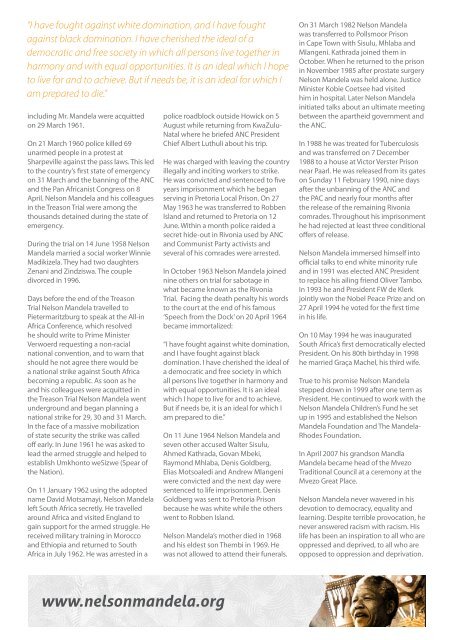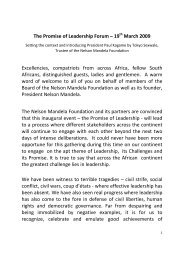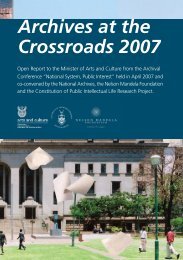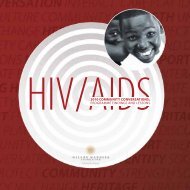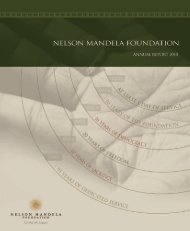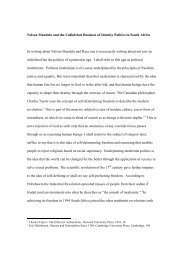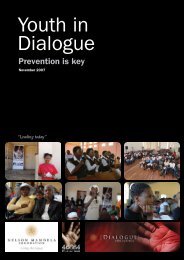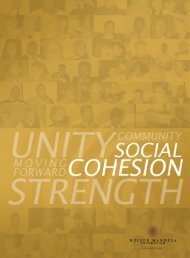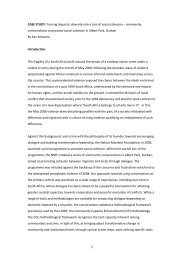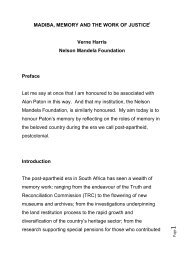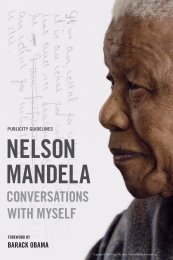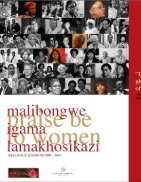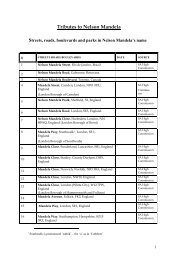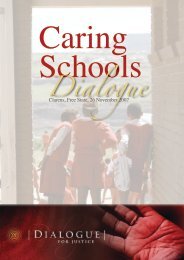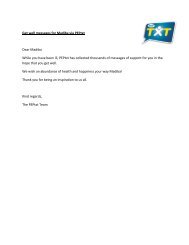Rolihlahla Mandela was born into the Madiba clan in Mvezo ...
Rolihlahla Mandela was born into the Madiba clan in Mvezo ...
Rolihlahla Mandela was born into the Madiba clan in Mvezo ...
Create successful ePaper yourself
Turn your PDF publications into a flip-book with our unique Google optimized e-Paper software.
“I have fought aga<strong>in</strong>st white dom<strong>in</strong>ation, and I have fought<br />
aga<strong>in</strong>st black dom<strong>in</strong>ation. I have cherished <strong>the</strong> ideal of a<br />
democratic and free society <strong>in</strong> which all persons live toge<strong>the</strong>r <strong>in</strong><br />
harmony and with equal opportunities. It is an ideal which I hope<br />
to live for and to achieve. But if needs be, it is an ideal for which I<br />
am prepared to die.”<br />
<strong>in</strong>clud<strong>in</strong>g Mr. <strong>Mandela</strong> were acquitted<br />
on 29 March 1961.<br />
On 21 March 1960 police killed 69<br />
unarmed people <strong>in</strong> a protest at<br />
Sharpeville aga<strong>in</strong>st <strong>the</strong> pass laws. This led<br />
to <strong>the</strong> country’s first state of emergency<br />
on 31 March and <strong>the</strong> bann<strong>in</strong>g of <strong>the</strong> ANC<br />
and <strong>the</strong> Pan Africanist Congress on 8<br />
April. Nelson <strong>Mandela</strong> and his colleagues<br />
<strong>in</strong> <strong>the</strong> Treason Trial were among <strong>the</strong><br />
thousands deta<strong>in</strong>ed dur<strong>in</strong>g <strong>the</strong> state of<br />
emergency.<br />
Dur<strong>in</strong>g <strong>the</strong> trial on 14 June 1958 Nelson<br />
<strong>Mandela</strong> married a social worker W<strong>in</strong>nie<br />
Madikizela. They had two daughters<br />
Zenani and Z<strong>in</strong>dziswa. The couple<br />
divorced <strong>in</strong> 1996.<br />
Days before <strong>the</strong> end of <strong>the</strong> Treason<br />
Trial Nelson <strong>Mandela</strong> travelled to<br />
Pietermaritzburg to speak at <strong>the</strong> All-<strong>in</strong><br />
Africa Conference, which resolved<br />
he should write to Prime M<strong>in</strong>ister<br />
Verwoerd request<strong>in</strong>g a non-racial<br />
national convention, and to warn that<br />
should he not agree <strong>the</strong>re would be<br />
a national strike aga<strong>in</strong>st South Africa<br />
becom<strong>in</strong>g a republic. As soon as he<br />
and his colleagues were acquitted <strong>in</strong><br />
<strong>the</strong> Treason Trial Nelson <strong>Mandela</strong> went<br />
underground and began plann<strong>in</strong>g a<br />
national strike for 29, 30 and 31 March.<br />
In <strong>the</strong> face of a massive mobilization<br />
of state security <strong>the</strong> strike <strong>was</strong> called<br />
off early. In June 1961 he <strong>was</strong> asked to<br />
lead <strong>the</strong> armed struggle and helped to<br />
establish Umkhonto weSizwe (Spear of<br />
<strong>the</strong> Nation).<br />
On 11 January 1962 us<strong>in</strong>g <strong>the</strong> adopted<br />
name David Motsamayi, Nelson <strong>Mandela</strong><br />
left South Africa secretly. He travelled<br />
around Africa and visited England to<br />
ga<strong>in</strong> support for <strong>the</strong> armed struggle. He<br />
received military tra<strong>in</strong><strong>in</strong>g <strong>in</strong> Morocco<br />
and Ethiopia and returned to South<br />
Africa <strong>in</strong> July 1962. He <strong>was</strong> arrested <strong>in</strong> a<br />
police roadblock outside Howick on 5<br />
August while return<strong>in</strong>g from KwaZulu-<br />
Natal where he briefed ANC President<br />
Chief Albert Luthuli about his trip.<br />
He <strong>was</strong> charged with leav<strong>in</strong>g <strong>the</strong> country<br />
illegally and <strong>in</strong>cit<strong>in</strong>g workers to strike.<br />
He <strong>was</strong> convicted and sentenced to five<br />
years imprisonment which he began<br />
serv<strong>in</strong>g <strong>in</strong> Pretoria Local Prison. On 27<br />
May 1963 he <strong>was</strong> transferred to Robben<br />
Island and returned to Pretoria on 12<br />
June. With<strong>in</strong> a month police raided a<br />
secret hide-out <strong>in</strong> Rivonia used by ANC<br />
and Communist Party activists and<br />
several of his comrades were arrested.<br />
In October 1963 Nelson <strong>Mandela</strong> jo<strong>in</strong>ed<br />
n<strong>in</strong>e o<strong>the</strong>rs on trial for sabotage <strong>in</strong><br />
what became known as <strong>the</strong> Rivonia<br />
Trial. Fac<strong>in</strong>g <strong>the</strong> death penalty his words<br />
to <strong>the</strong> court at <strong>the</strong> end of his famous<br />
‘Speech from <strong>the</strong> Dock’ on 20 April 1964<br />
became immortalized:<br />
“I have fought aga<strong>in</strong>st white dom<strong>in</strong>ation,<br />
and I have fought aga<strong>in</strong>st black<br />
dom<strong>in</strong>ation. I have cherished <strong>the</strong> ideal of<br />
a democratic and free society <strong>in</strong> which<br />
all persons live toge<strong>the</strong>r <strong>in</strong> harmony and<br />
with equal opportunities. It is an ideal<br />
which I hope to live for and to achieve.<br />
But if needs be, it is an ideal for which I<br />
am prepared to die.”<br />
On 11 June 1964 Nelson <strong>Mandela</strong> and<br />
seven o<strong>the</strong>r accused Walter Sisulu,<br />
Ahmed Kathrada, Govan Mbeki,<br />
Raymond Mhlaba, Denis Goldberg,<br />
Elias Motsoaledi and Andrew Mlangeni<br />
were convicted and <strong>the</strong> next day were<br />
sentenced to life imprisonment. Denis<br />
Goldberg <strong>was</strong> sent to Pretoria Prison<br />
because he <strong>was</strong> white while <strong>the</strong> o<strong>the</strong>rs<br />
went to Robben Island.<br />
Nelson <strong>Mandela</strong>’s mo<strong>the</strong>r died <strong>in</strong> 1968<br />
and his eldest son Thembi <strong>in</strong> 1969. He<br />
<strong>was</strong> not allowed to attend <strong>the</strong>ir funerals.<br />
On 31 March 1982 Nelson <strong>Mandela</strong><br />
<strong>was</strong> transferred to Pollsmoor Prison<br />
<strong>in</strong> Cape Town with Sisulu, Mhlaba and<br />
Mlangeni. Kathrada jo<strong>in</strong>ed <strong>the</strong>m <strong>in</strong><br />
October. When he returned to <strong>the</strong> prison<br />
<strong>in</strong> November 1985 after prostate surgery<br />
Nelson <strong>Mandela</strong> <strong>was</strong> held alone. Justice<br />
M<strong>in</strong>ister Kobie Coetsee had visited<br />
him <strong>in</strong> hospital. Later Nelson <strong>Mandela</strong><br />
<strong>in</strong>itiated talks about an ultimate meet<strong>in</strong>g<br />
between <strong>the</strong> apar<strong>the</strong>id government and<br />
<strong>the</strong> ANC.<br />
In 1988 he <strong>was</strong> treated for Tuberculosis<br />
and <strong>was</strong> transferred on 7 December<br />
1988 to a house at Victor Verster Prison<br />
near Paarl. He <strong>was</strong> released from its gates<br />
on Sunday 11 February 1990, n<strong>in</strong>e days<br />
after <strong>the</strong> unbann<strong>in</strong>g of <strong>the</strong> ANC and<br />
<strong>the</strong> PAC and nearly four months after<br />
<strong>the</strong> release of <strong>the</strong> rema<strong>in</strong><strong>in</strong>g Rivonia<br />
comrades. Throughout his imprisonment<br />
he had rejected at least three conditional<br />
offers of release.<br />
Nelson <strong>Mandela</strong> immersed himself <strong><strong>in</strong>to</strong><br />
official talks to end white m<strong>in</strong>ority rule<br />
and <strong>in</strong> 1991 <strong>was</strong> elected ANC President<br />
to replace his ail<strong>in</strong>g friend Oliver Tambo.<br />
In 1993 he and President FW de Klerk<br />
jo<strong>in</strong>tly won <strong>the</strong> Nobel Peace Prize and on<br />
27 April 1994 he voted for <strong>the</strong> first time<br />
<strong>in</strong> his life.<br />
On 10 May 1994 he <strong>was</strong> <strong>in</strong>augurated<br />
South Africa’s first democratically elected<br />
President. On his 80th birthday <strong>in</strong> 1998<br />
he married Graça Machel, his third wife.<br />
True to his promise Nelson <strong>Mandela</strong><br />
stepped down <strong>in</strong> 1999 after one term as<br />
President. He cont<strong>in</strong>ued to work with <strong>the</strong><br />
Nelson <strong>Mandela</strong> Children’s Fund he set<br />
up <strong>in</strong> 1995 and established <strong>the</strong> Nelson<br />
<strong>Mandela</strong> Foundation and The <strong>Mandela</strong>-<br />
Rhodes Foundation.<br />
In April 2007 his grandson Mandla<br />
<strong>Mandela</strong> became head of <strong>the</strong> <strong>Mvezo</strong><br />
Traditional Council at a ceremony at <strong>the</strong><br />
<strong>Mvezo</strong> Great Place.<br />
Nelson <strong>Mandela</strong> never wavered <strong>in</strong> his<br />
devotion to democracy, equality and<br />
learn<strong>in</strong>g. Despite terrible provocation, he<br />
never answered racism with racism. His<br />
life has been an <strong>in</strong>spiration to all who are<br />
oppressed and deprived, to all who are<br />
opposed to oppression and deprivation.<br />
www.nelsonmandela.org


